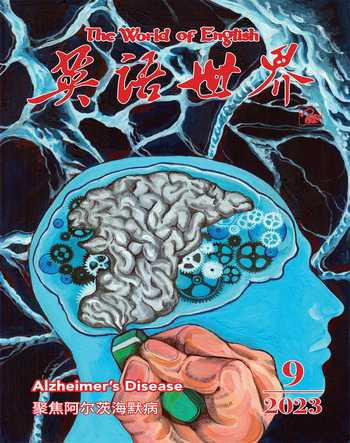A Craving for Adventure1渴望冒险
2023-09-19沙博理任东升/译
沙博理 任东升/译
In 1941 I was one of a crew of nursemaids to a 40-mm Bofors anti-aircraft gun. We were stationed in a swamp euphemistically known as the Jersey Meadows, guarding Westinghouse and General Electric plants from attack by German bombers. There were about a dozen of us. We served in shifts—two hours on, four hours off, around the clock2 —waiting for the raids which fortunately, considering our marksmanship, never came.
1941年,我成了博福斯40毫米高射炮兵班的一员,驻扎在美其名曰“泽西湿地”的一片沼泽区,保卫西屋电气和通用电气公司的工厂免受德国飞机轰炸。我们一共十来个人,轮流值守,上两小时岗休四小时,全天候警戒,以防偷襲。幸而,敌机顾忌我们的炮口,就没来过。
Then word spread that an Army Specialized Training Program3 had been established. Men were being sent to the universities, in uniform, to learn foreign languages for possible future assignment abroad.
正当时,有言传陆部特训科已经启动,我们这些当兵的要被送到高校学习外语,期间保留军籍,以备日后派往国外执行任务。
Why not? I had had a few years of French in high school and college. At least it would get me out of the swamp. I applied. Spruce and polished, I stood smartly at attention before the board.
这岂不是好机会吗?且不说我高中和大学学过几年法语,这起码能让我从这片沼泽地脱身。我就提出了申请。好好捯饬一番,彬彬有礼,精神抖擞,我大方地站到考核委员会面前。
They informed me I had passed the French tests. However, they said, they had more French students than they could use. How would I like to study Chinese?
他们通知我,法语考试我是过了的,可又说学法语的已经有不少了,用不着那么多,问我乐意学汉语吗?
I stood goggle-eyed, gaping like a cod.4
我目瞪口呆,杵在那里。
A major oiled in smoothly with a soft sell.5
一位少校不失时机地提示道:
“You live in New York City6, dont you?”
“你家在纽约,对不? ”
“Yes sir.”
“对的,长官。”
“Well, while Im not at liberty to divulge the details, I can tell you this—the college we are planning to send you to is in New York State. Youll be able to get home fairly often.”
“你看,细节我虽不便透露,但可以给你透个风,打算送你去的大学就在纽约州,你还能三天两头回趟家呢。”
I still hesitated. Chinese? Id never given it a thought. The major threw in the clincher.
我还是迟疑难决,汉语?我连想都没想过。少校抛出了杀手锏:
“Its co-ed.”
“那儿男女同校。”
“Ill take it!”
“那成! ”
Little did I know, as they say in the Victorian novels, that the decision I had made was the first step along the road to a life and a career in China.
那会儿我丝毫料不到,就跟维多利亚时期小说里写的那样,我做的这个决定竟成了领我踏上去中国安身立业之路的第一步。
To keep ourselves busy and because we were interested, a few of us sat in on Chinese language courses at the University of Hawaii in our spare time. By that time I was really hooked on Chinese.
为了不闲着,也是出于对汉语的兴趣,我们几个人得空时旁听了夏威夷大学的汉语课程。到了那会儿我才真的迷上学汉语。
The end of 1946 found me back in New York, a civilian again. Under the G.I. Bill7—a veteran was entitled to paid tuition in a university plus subsistence allowance for roughly as many years as he had served in the armed forces. I decided to use some of that time studying more Chinese, until I could make up my mind what I wanted to do with my life. I enrolled at Columbia, taking nothing but Chinese language courses. I did two terms there, then transferred to Yale where I did a third.
1946年底,我返回纽约,又成了平头百姓一个。根据《退伍军人权利法案》, 退伍兵可以免学费进高校学习,且有与当兵年限相匹配的生活津贴。于是我就决定好好利用这段时间接着深造汉语,等弄明白过怎样的生活再说别的。我进了哥伦比亚大学,不学别的,只学汉语。在那学了两个学期后转入耶鲁大学,学了第三学期。
Wandering amid Yales ivy-clad towers was pleasant enough, but I couldnt go on being a schoolboy indefinitely. To what use could I put the Chinese which so intrigued me? A few of the Chinese students I had met at Columbia and Yale suggested that I go to China. They said an American lawyer who spoke Chinese would certainly do well. I wasnt so sure, but the idea appealed to me. After hitch-hiking and riding freight across America during the depression, why not a trip across the Pacific? I still had a craving for adventure.
漫步于耶鲁校园,驻足于爬满常青藤的哥特式尖塔下,确实令人惬意,但我总不能就这么一直当个学生吧。汉语令我如此心醉,可学了又有什么用呢?在哥伦比亚和耶鲁结识的几位中国同学都建议我到中国去,说会汉语的美国律师肯定混得开。我没那么自信,但这主意很有诱惑力。大萧条时期我连搭便车、扒货运火车横穿美国的事儿都干了,再来一次横渡太平洋又有何难?况且我依然渴望冒险。
My total finances consisted of US$500—my army discharge bonus. I spent US$300 of it for a ticket on a small freighter which had passenger accommodations for four, traveling from New York to Shanghai via the Panama Canal.
我的全部身家就500美金,是那筆退役费。我花其中300买了张四人舱的小型货轮船票,从纽约启航,途经巴拿马运河驶向上海。
I was sick as a dog from the time we passed Cape Hatteras, off the Carolinas. What is it they say about seasickness? “First youre afraid youll die, then youre afraid you wont!” Miraculously, from the Panama Canal on, I was cured. I began to enjoy the beauty of the sea, its changing shades of blue and gray and green. We saw porpoises and whales. We came quite close to one great cow of a mother whale and her baby. They lay meditating, placidly unconcerned.
途经卡罗来纳州附近的哈特拉斯角后,我晕吐得不成人样。人们是怎么说晕船来着?“起先是怕一命呜呼,后来是怕求死不能。”到了巴拿马运河,我竟奇迹般地不晕了,便能欣赏到大海之美。从深邃湛蓝到朦胧暗灰,再到翡翠碧波,变化万千,海豚和鲸鱼遨游其间。我们曾一度距离一头巨型母鲸和她的幼鲸很近,它们四平八稳地漂浮着,一副若有所思的样子,对我们熟视无睹。
The ocean began turning yellow when we were still three days from land. We were approaching the estuary of the Yangtze running from the far west across Chinas middle, past Chongqing, Wuhan and Nanjing to the bustling eastern port of Shanghai, which means literally “on the sea.” The yellow tinge deepened to brown. A hazy blur grew on the horizon.
离靠岸还有三天,海水开始泛黄。船向着长江口驶近,长江发源于中国的西部,横穿中部,流经重庆、武汉、南京,最后到达繁华的东部港口上海,字面意思就是“在海上”。黄色海水渐深至褐色,海平面上浮现出朦胧的轮廓。
China!
是中国!
1原文选自沙博理的英文自传My China: The Metamorphosis of a Country and a Man(Beijing: New World Press, 1997)第24—29页,选文有所删减,标题为译者所加。 2原文多介词,on和off译为动词“上”和“休”,更符合汉语习惯,两个介词词组around the clock和in shifts,分别译为“轮流值守”和“全天候警戒”,译文基本和原文保持相宜的长度和基本一致的断句,使得译文在节奏感上与原文取得一致。 3简称ASTP,美國陆军专业训练计划。1941年太平洋战争爆发后,美军需要大量具备专业素质的军官,因而与哈佛、芝加哥大学等多所高校合作,设立ASTP项目培训人才,在当时被译为“陆部特训科”,特训科目主要有工程、医疗和外语三大类。
4 goggle-eyed和gaping like a cod运用四字格“目瞪口呆”来表达,同时stood译为“杵”更进一步表达出惊呆的状态,增加画面感。 5 oiled一词应有“花言巧语”的意思,但考虑到讲话人陆军少校的身份,翻译为“不失时机”较为妥当。soft sell本意为销售领域的一种温和推销策略,此处意指少校从侧面提示学汉语的好处,劝说沙博理接受汉语培训。 6如果将本句简单地译为“你住在纽约”,容易造成歧义,因为沙博理此时住在军队,而非纽约,因此将其翻译为“你家在纽约”更加准确。同时可以与下文中的home相呼应。
7全称Servicemens Readjustment Act of 1944,《退伍军人权利法案》,简称G. I. Bill,是美国国会于1944年颁布的旨在帮助退伍军人在二战后更好适应平民生活的法案。基本内容有:美国国会授权联邦政府,对在二战中服兵役超过90天的美国公民提供医疗、卫生、住房等方面的优惠政策;对因战争中断深造机会的美国公民提供资助,让他们有机会接受适当的教育或训练。
